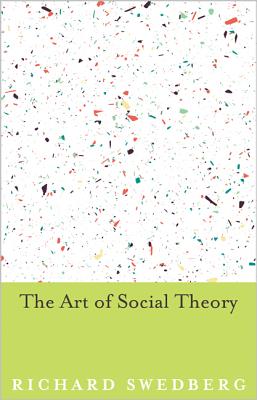

 Princeton University Press
Princeton University Press
The Art of Social Theory


Key Metrics
- Richard Swedberg
- Princeton University Press
- Hardcover
- 9780691155227
- 9.14 X 5.24 X 0.84 inches
- 1.1 pounds
- Social Science > Sociology - Social Theory
- English
 Secure Transaction
Secure TransactionBook Description
A practical guide to the art of theorizing in the social sciences
In the social sciences today, students are taught theory by reading and analyzing the works of Karl Marx, Max Weber, and other foundational figures of the discipline. What they rarely learn, however, is how to actually theorize. The Art of Social Theory is a practical guide to doing just that.
In this one-of-a-kind user's manual for social theorists, Richard Swedberg explains how theorizing occurs in what he calls the context of discovery, a process in which the researcher gathers preliminary data and thinks creatively about it using tools such as metaphor, analogy, and typology. He guides readers through each step of the theorist's art, from observation and naming to concept formation and explanation. To theorize well, you also need a sound knowledge of existing social theory. Swedberg introduces readers to the most important theories and concepts, and discusses how to go about mastering them. If you can think, you can also learn to theorize. This book shows you how.
Concise and accessible, The Art of Social Theory features helpful examples throughout, and also provides practical exercises that enable readers to learn through doing.
Author Bio
My two main areas of research are economic sociology and social theory. Economic sociology has been a vital interest of mine since the early 1980s; and today I mainly work on current topics. From early on I have also been fascinated by social theory, especially theorizing — what theorizing is and how it can be taught to students through practical exercises. My main work on this topic is The Art of Social Theory (2014). I have also worked on social mechanisms (see Social Mechanisms [1998]; ed. with Peter Hedström).
In the early 1980s I became interested in economic sociology, and I have had the pleasure to help this field grow into one of the major subfields in sociology. My contribution to this has consisted of general works as well as specific studies. For the former, see especially (ed. with Neil Smelser) Handbook of Economic Sociology (1994, 2005) and (ed. with Mark Granovetter) The Sociology of Economic Life (1992, 2001, 2011). For the latter, see e.g. (ed. with Victor Nee) The Economic Sociology of Capitalism (2005), (ed. with Trevor Pinch) Living in a Material World (2008) and (ed. with Hirokazu Miyazaki) The Economy of Hope (2017).
Along the road I have also made a number of studies of the major theoreticians in economic sociology, such as Joseph Schumpeter, Max Weber and Alexis de Tocqueville. The study of Schumpeter is formally a biography, but in reality centered around the relationship of economic theory to economic sociology. The study of Weber attempts to lay a theoretical foundation for economic sociology by following Weber’s leads in Ch.2 of Economy and Society. In my work on Tocqueville my interest in economic sociology comes together with that of theorizing. I emphasize the sociological aspects of Tocqueville’s analysis of the economy, but also how he experimented with different types of data and theories, to make sense of things. See Schumpeter – A Biography (1991), Max Weber and the Idea of Economic Sociology (1994) and Tocqueville's Political Economy (2009).
Besides social theory and economic sociology, I have also written on various other topics — such as the role of civic courage; (with Wendelin Reich) on George Simmel’s metaphors; on Rodin’s statue “The Burghers of Calais”; and (with Trevor Pinch) on Wittgenstein’s visit to Ithaca in 1949. These articles can be found on my webpage.
Today I mainly try to write sociological essays, with an emphasis on new ideas. The topics vary, from traditional ones in social theory to more unorthodox ones, with the same for economic topics.
Education
MM.L. (“Juris kandidat”), Faculty of Law, Stockholm University June 1970;
Ph D, Department of Sociology, Boston College May 1978.
Source: Cornell University
Videos








Community reviews
Write a ReviewNo Community reviews